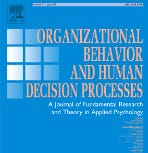New Article in OBHDP: Why “Unplugging” from Work Can Hurt Your Career—The Detachment Paradox
The detachment paradox: Employers recognize the benefits of detachment for employee well-being and performance, yet penalize it in employee evaluations
https://www.sciencedirect.com/science/article/pii/S0749597825000159
Eva C. Buechel, Elisa Solinas
It is well-established that unplugging from work—what scholars call psychological detachment—is good for our health and helps us perform better when we’re on the clock. Armed with this knowledge, many managers encourage employees to take time off and disconnect after hours. When it comes time to award promotions, however, those same managers often penalize employees who actually detach. This “detachment paradox” puts employees in a difficult position.
Across 16 studies involving both managers and laypeople, researchers found that employees who use common detachment strategies—e.g., out-of-office emails or requesting vacation days—are consistently rated as less promotable. This holds true even when those actions are taken for good reasons, such as caring for a sick family member. The authors found that the detachment penalty occurs because managers interpret unplugging (detachment) as a signal that the employee’s priorities lie elsewhere.
The authors did uncover a silver lining. Their results suggest that formal company policies that encourage detachment—like prohibiting weekend emails—can reduce this bias. Taken together, this research indicates that organizations should take an active role to ensure that employees’ efforts to “recharge their batteries” by detaching during non-work hours do not harm their career prospects.
P.S. if you can’t access the full-text let us (m-kouchaki@kellogg.northwestern.edu or mikebaer@asu.edu) know and we’d be happy to share a copy.


